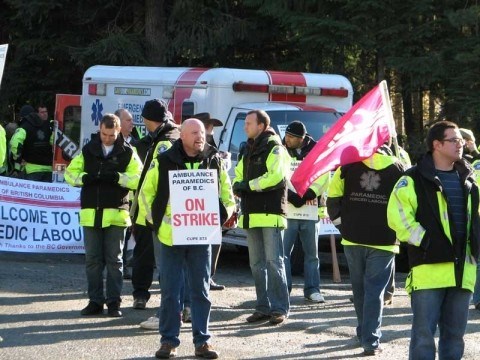B.C. paramedics have been on a work-to-rule strike since April 1, but matters boiled over on Tuesday when a group of 50 paramedics from Sea to Sky, Lower Mainland and the Interior formed a blockade along the road to the Whistler Sliding Centre.
They stopped vehicles to hand out literature, including vehicles full of athletes headed to the Olympic venue, but allowed them to continue driving after informing them of the reasons for their strike.
There are several reasons why paramedics are upset, according to Bill Jones (BJ) Chute, the Director of Public Education for the paramedics and spokesperson for the union members on the site.
The first is in relation to the B.C. Ambulance Services' (BCAS) request to have Olympic test events declared an essential service, at a time when the paramedics are on strike for better wages and working conditions. Olympic events are already considered an essential service by the province, but the BCAS wanted clarification from the Labour Relations Board of B.C. that the designation included test events like this week's International Training Week as well as the actual Games.
"The fact is that we have just as many ambulances designated to this event as to the entire community of Whistler," said Chute. "There are communities that have next to no service, and yet we have two ambulances designated for this event while other towns make do with less."
The initial strike was over compensation, but both sides have agreed to a three per cent wage increase and have tentatively agreed to a 1.2 per cent labour market adjustment if the funding can be found in the organization's budget - such as cutting overtime hours for full time staff, which is also a contentious idea in some quarters. There are still issues like signing bonuses and compensation for rural ambulance services where paramedics are paid infrequently when they are called into action, but the two sides are in mediation.
Currently Paramedics are paid $2 an hour when they are on call, although that wage goes up when they are responding to emergency calls.
Chute says it's frustrating that talks have gone on this long and says that members are prepared to continue to work to rule - only answering emergency calls and forgoing other assignments - through the Olympics if necessary. For that matter, he says the paramedics are still in the dark about Olympic plans, although the BCAS has told the media that they do have a plan in place.
"There's no plan that we've been made aware of for paramedics during the Games," said Chute. "We don't know how many ambulances we have to provide, where they're going to come from, how many paramedics will be working, where they're going to stay and eat, how they're going to travel if we're rotated through the venues, all those kinds of things.
"I want to emphasize that we're not anti-Olympics, we were as excited as anyone when we won the Olympics. It's our employer who has stalled here, the B.C. Ambulance Service and the province."
Chute says that his members are prepared to carry on the picket for all three weeks of training at the sliding centre if need be, and expects there will be some type of presence unless the dispute is settled and strike lifted.
"The vast majority of people are accommodating and support what's happening, although a few people were upset (at the picket line)," Chute said.
"I don't know what kind of presence we're going to have day-to-day, but there will be more protests over the next three weeks. It's up to us to keep the picket going as best as we can."
The RCMP did attend the picket line on Tuesday in response to complaints that picketers were blocking Whistler Blackcomb's maintenance yard as well as access to the sliding centre. The protesters complied by moving members out of the way.




